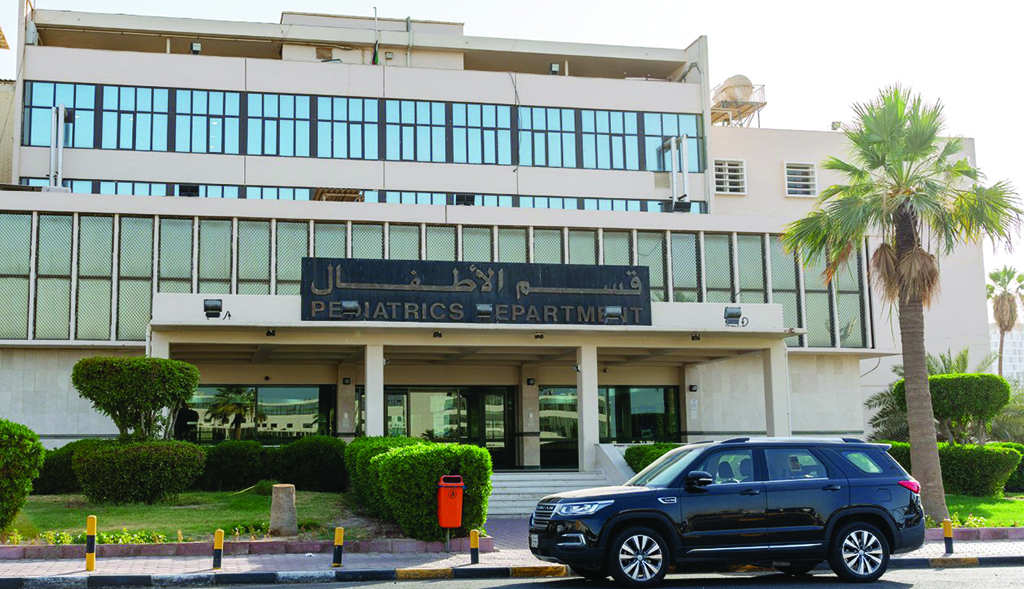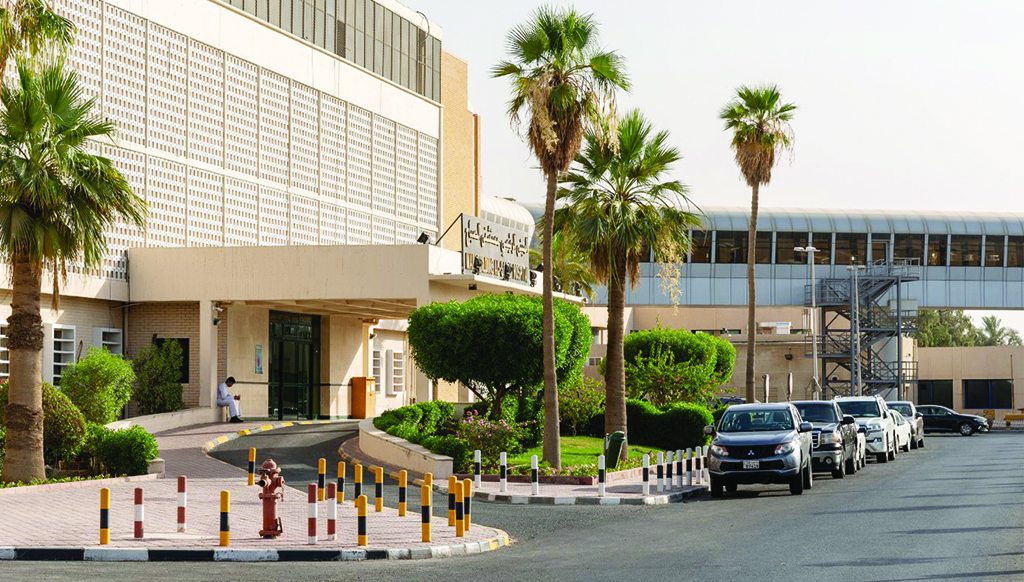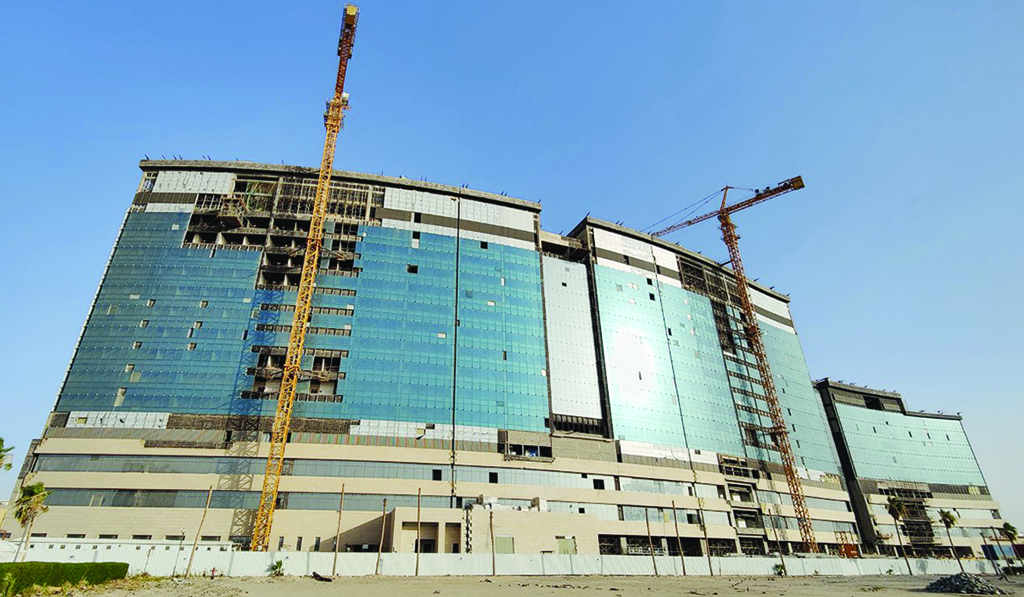KUWAIT: Al-Sabah Hospital, the first grand hospital executed by the Ministry of Health, celebrated on Monday 60 years since its establishment in 1962. Kuwait's Amir at the time, Sheikh Abdullah Al-Salem Al-Sabah, inaugurated Al-Sabah Hospital, located 10 kilometers from Kuwait City, to be a symbol of the modern urban renaissance and a distinctive mark in the march of medical services witnessed over the years. The total area of land occupied by the hospital, including gardens, roads and parking lots, is approximately 400 acres, with construction period of two and a half years at a cost of KD 5,255,000 million. During first year of the operation of Al-Sabah Hospital, the number of patients admitted to the hospital for treatment reached 8,400 patients, with 4,871 surgeries, while visitors of outpatient clinics reached 43,850.
 Al-Sabah Hospital Director Dr Nayef Al-Harbi.
Al-Sabah Hospital Director Dr Nayef Al-Harbi.
Quantum leap
Al-Sabah Hospital Director Dr Nayef Al-Harbi said that health sector in Kuwait witnessed quantum leap after inaugurating Al-Sabah Hospital, the largest medical edifice in Kuwait, and the second oldest hospital after Al-Amiri hospital, built in 1941. The hospital includes several departments, including general surgery, intensive care, ear, nose and throat, internal diseases, a heart unit, and a children's department. While technical departments include diagnostic radiology, ultrasound, laboratories, histopathology unit, pharmacies, natural medicine, the mortuary, nutrition department, and kitchens. The bed capacity is in the surgery department has 160 beds, including intensive care, the internal medicine department includes 140 beds, and the heart unit with seven beds, while the Ear, Nose and Throat Department includes 98 beds.
As for the pediatric department, Dr Harbi said that it has eight specialized unites including accident clinics, blood diseases, leukemia, heart and kidney diseases, genetic diseases, developmental medicine, neurological diseases, brain planning, muscle and psychological diseases. He pointed out that the developmental medicine unit, opened in 1993, is unique in Kuwait and provides medical services to a large number of children. It evaluates and diagnoses children with disabilities, whether they are mental, physical, educational or behavioral. In 1995 Endocrinology unit was opened in addition to other clinics for asthma, kidney, orthopedics, nutrition, genetics, heart and psychiatry, Dr Harbi added.
In 2014, the surgical intensive care unit was rehabilitated according to the latest technical specifications and requirements for infection prevention and patient safety. It includes 14 beds and two sections, one for extended care and the other for intensive care after surgical operations. The new unit has been equipped with the latest vital function monitoring devices, artificial respiration, fluid infusion devices and medicines for patients whose care the new unit specializes in after surgery, Dr Al-Harbi explained. In recent years, the hospital expanded to become an integrated medical city, named Al Sabah Medical District, and includes many advanced centers and hospitals, mainly the New Al-Sabah Hospital.
 Assistant Secretary-General for Planning and Follow-up at the General Secretariat of the Supreme Council for Planning and Development Nadia Al-Hamlan.
Assistant Secretary-General for Planning and Follow-up at the General Secretariat of the Supreme Council for Planning and Development Nadia Al-Hamlan.
New hospital
The new Al-Sabah Hospital project is considered one of the most important strategic projects in the development plan and Kuwait Vision 2035, said the Assistant Secretary-General for Planning and Follow-up at the General Secretariat of the Supreme Council for Planning and Development Nadia Al-Hamlan. She added that it would have a significant impact on global competitiveness indicators in the field of health. The project falls within the eighth program of promoting health and well-being, part of the Development Plan of 2020-2025, and serves the policy of reforming health care delivery systems and adopting modern treatment technology and techniques. She added that the project located on an area of 88,710 square meters, with a capacity of 771 beds, including 617 beds for inpatients, at a rate of 120 percent to the current bed capacity, pointing out that the total completion rate has reached 75 percent so far.



The project, equipped with the latest advanced technology and smart climate systems, aims to provide a high level of health and medical care services with the latest medical equipment and modern technology to reduce patient waiting times and cases of dispatch for treatment abroad, she pointed out. The hospital consists of a basement, ground floor, and 12 floors, and central services building in addition to a car parking building with a capacity of 1,257 spaces. The new Al-Sabah Hospital project aims to expand the health service to match the population increase and to develop new services and treatment units to meet the needs and expectations of beneficiaries of the health service, Hamlan said. The hospital will include 105 intensive care beds, many specialized departments, as well as 72 outpatient clinics for various medical specialties, laboratories, pharmacies, reception and nutrition, storage spaces and an airstrip, and an integrated system to treat waste generated by the Nuclear Medicine Department, designed with the latest technology.
The new Al-Sabah Hospital project is an integrated project with a construction area of about 283,000 square meters and includes three buildings, two east and west towers, one for internal medicine and the other for surgery, and the main building designated for operations and emergency. Kuwait's Ministry of Health is keen to follow up on the implementation of construction and development projects according to the timetable within the state's development plan and the government's work program. In the meanwhile, it keeps providing health care to citizens and residents in accordance with the latest international standards for the quality of health care in various specialties. - KUNA




